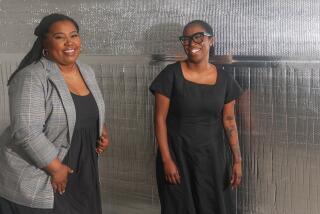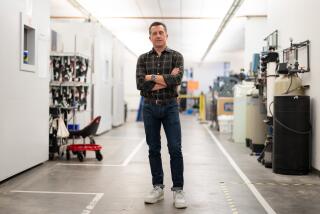SolarCity CEO Lyndon Rive built on a bright idea
The gig: Lyndon Rive, 36, chief executive of SolarCity Corp., a company co-founded in 2006 with his older brother, Peter, that helped popularize a new direction in residential solar power development. The San Mateo, Calif., company installs solar panels for homes, businesses and government entities. But instead of selling the panels to the customer, SolarCity usually retains ownership of them and sells the electricity to the client. That cuts out much of the upfront cost involved with going solar.
“The homeowner isn’t really required to do anything,” Rive said. “They get a smaller electric bill every month and they get the good feeling that comes from knowing that most of their home electricity is generated by clean energy from the sun.”
Sunny skies: SolarCity, which went public last December at $8 a share, now trades above $30. The company has about 3,500 employees and more than 68,000 customers in 14 states, up from about 1,400 employees and more than 18,000 customers at the end of 2011. In April, SolarCity opened a 75-worker operations center in Riverside County to meet growing demand in the Inland Empire. In August, the company opened a 61-worker operations center in Chatsworth.
Family ties: Peter Rive, SolarCity’s chief operating officer, “takes care of delivery. I take care of demand.... The company would not be close to where it is today without him.” A third Rive brother, Russell, helped co-found an earlier venture called Everdream, a software company that the brothers eventually sold to Dell Inc. Their cousin and SolarCity’s chairman is Elon Musk, founder of PayPal, the Tesla Motors electric car company and SpaceX. Musk “is probably the guy who has given me the most guidance and the most positive help with our company.... He is a business partner. He is one of my best friends. A passionate and amazing individual.”
Listen to Mom: Rive’s devotion to his first entrepreneurial venture — distributing homeopathic medications — nearly got him kicked out of high school in his home town of Pretoria, South Africa. Rive convinced the principal to let him graduate as long as he could pass his exams. But his mother made sure there was no goofing off.
“If I went to bed early and did not work late, she would give me a lecture: 7 a.m. to 11 p.m. was the work schedule. If I took any shortcuts, I’d get lectured. I have to give her credit. She would wake up in the morning, make me tea and say, ‘Time to wake up and go to work.’”
Brainstorming: The idea for SolarCity was born on a 2004 trip that Rive and Musk took to the annual Burning Man event in Nevada’s Black Rock Desert. “I was brainstorming with Elon.... My brother and I are extremely passionate about the environment and the challenges that we face. Where could we add the most value? What business would he recommend that I get into? His idea was that I should get into solar.”
Find a new way: “From day one, we didn’t want to be a solar installer or a financial company. We started this company to be your next energy company. Our goal is to become the most compelling energy company of the 21st century.... For the first time in history we can create electricity at the place where it is needed instead of a centralized location hundreds of miles away.... Utilities are an old industry. They always had a monopoly.... Now we can force competition, give consumers more choice.”
Facing challenges: “Getting the word out to potential customers. That is the biggest challenge that we have. People don’t understand it. Friends of mine, who know me and know my business, after doing this for six years they still ask, ‘What’s the payback?’ ... It is cheaper, cleaner energy. How hard is this to understand? The concept is so foreign. People are so used to getting their energy from only one source, the utility, they don’t see it’s possible that they can get electricity from something else at a lower rate.”
Ignore resistance: “Punch through. Just go for it. In my case, whenever you have intrinsic monopolies, they will resist any change where possible. There will always be someone who will tell you that you can’t do what you want to do. Entrenched industries will always set the rules in ways that resist competition. Over time, the right technology will win.”
Personal: Rive’s hobby, underwater hockey, brought him to a competition in the United States in 1998. He liked California so much that he decided to move. He has been a member of the U.S. underwater hockey team for years. He and his wife, Madeleine, have two young sons. Someday, Rive said, he plans to work with them to start a business of their own.
Twitter: @RonDWhite







